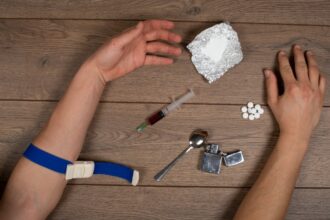Addiction is a complex and challenging journey that affects not just the individual struggling with substance use but also their family members. For individuals in addiction recovery, family members and their support, can transform their journey into a path of healing from substance use disorder and renewal. Let us explore the major role family involvement plays in substance abuse treatment, offering practical strategies and insights to foster a healthier home environment and effectively support the person’s recovery.
Understanding the Role of Family in Addiction Recovery
Addiction recovery is a journey that takes time, patience, and commitment. While the addicted individual must take steps to recover, family involvement can make a big difference. Families affected by drug abuse often experience stress, communication breakdowns, and emotional wounds. However, when families offer emotional support and set healthy boundaries, they can help the recovering person regain stability.
A strong support system from family members can reduce the risk of relapse and encourage long-term recovery. Family members play a key role in creating a healthier home environment for recovery.
How Addiction Affects Families
When someone struggles with drug or alcohol abuse, it often impacts the entire family unit. Family members may experience feelings of guilt, shame, anger, or sadness. For young adults or children in the family, addiction can leave long-lasting emotional scars.
In some cases, the “lost child” phenomenon occurs, where the needs of other family members are ignored because the focus is on the addicted individual. This can weaken communication and lead to negative consequences for everyone involved.
The Importance of Family Therapy
One of the best ways to address the impact of addiction on families is through family therapy and an Addiction Treatment Improvement Protocol. This form of therapy allows family members to come together in a safe space to share their feelings, rebuild trust, and learn how to better support their loved one in an evidence-based and systematic way.
Some of the lessons families learn from treatment centers that offer family therapy include:
- Improve communication amongst the family members.
- Address unresolved conflicts in the family
- Set healthy boundaries to avoid enabling behaviors
- Support recovery without neglecting their own emotional needs
Many Massachusetts drug rehab centers include family therapy as part of their treatment services. These programs help families work together to support the recovering person’s treatment and recovery, while also focusing on their own well-being.
Practical Strategies for Supporting a Loved One in Recovery
If your loved one is in recovery, here are some practical ways you can provide family support in addiction recovery:
1.) Educate Yourself About Addiction
Understanding the nature of addiction and its effects on the brain can help you approach your loved one with compassion. Learning about substance use disorders and the treatment process can also give you the tools to better support their recovery.
2.) Participate in Family Therapy
Taking part in family therapy sessions allows you to address issues in a structured and supportive environment. It also helps you gain insight into your loved one’s struggles and learn ways to support their recovery journey.
3.) Set Healthy Boundaries
Boundaries are needful in any relationship but are especially important in addiction recovery. Setting healthy boundaries ensures that you do not enable your loved one’s addictive behaviors while encouraging them to take responsibility for their recovery.
4.) Encourage Participation in Support Groups
Being part of a support group builds a sense of community and promote overall public health. These groups provide a space to share experiences, learn from others, and find emotional recovery support.
5.) Offer Emotional Support
A recovering person, when they enter treatment, needs reassurance that they are not alone. Providing emotional support, encouragement, and patience can strengthen their determination to maintain sobriety.
6.) Create a Healthier Environment
A healthier environment at home can help your loved one avoid triggers. Removing alcohol or drugs from the home and fostering healthy relationships can play a crucial role in creating a healthier home environment.
7.) Practice Self-Care
Supporting someone in recovery for substance use disorder can be emotionally exhausting. It’s important to prioritize self-care by seeking therapy, joining support groups, or finding hobbies that bring you joy. Taking care of yourself ensures you can better support your loved one.
Addressing Mental Health in Addiction Recovery
Addiction often goes hand in hand with mental health disorders, such as depression or anxiety. These co-occurring issues can make recovery more challenging. It’s important to address both addiction and mental health during the recovery process.
Many treatment providers offer integrated care that includes mental health services alongside addiction treatment. Families can also advocate for access to mental health services administration to ensure their loved one receives the help they need.
Encouraging your loved one to speak with school counselors or a primary care doctor can also help in connecting them with additional resources for support.
Community Resources for Families
There are many community resources available to help families affected by addiction. Addiction treatment centers provide a variety of treatment options, including individual therapy, family therapy, and support groups, most of which are covered by health insurance. These services guide both the recovering person and their family members through the recovery process.
Families can also use online forums, workshops, and recovery networks to gain additional insights into addiction recovery. Building a strong support system outside the family can reduce stress and foster healing from substance use disorder.
Creating a Recovery Plan
A recovery plan helps individuals suffering from addiction outline their goals and strategies for maintaining sobriety. Family members can play an important role in creating recovery supports and reinforcing this plan. A good recovery plan should include:
- Regular check-ins with a treatment provider
- Attendance at support groups
- Ongoing mental health services
- Steps for addressing triggers and cravings
- A plan for rebuilding relationships within the family unit
Working together on a recovery plan creates a shared sense of responsibility and strengthens family bonds, as well working to reduce risk of relapse.
Long-Term Benefits of Family Support
The role of family involvement in the addiction treatment process is a powerful tool in the recovery journey. Studies show that individuals with strong family support are more likely to achieve long-term recovery. By offering encouragement, setting boundaries, and fostering healthy relationships, families can help their loved ones maintain sobriety and rebuild their lives. The benefits of family support extend beyond the recovering person. The entire family unit grows stronger, communication improves, and a sense of stability returns to the home.
By creating a healthier home environment and encouraging the use of community resources, families can support their loved one’s recovery and foster healing for themselves. Together, families can overcome the challenges of addiction and create a brighter future for everyone involved.















